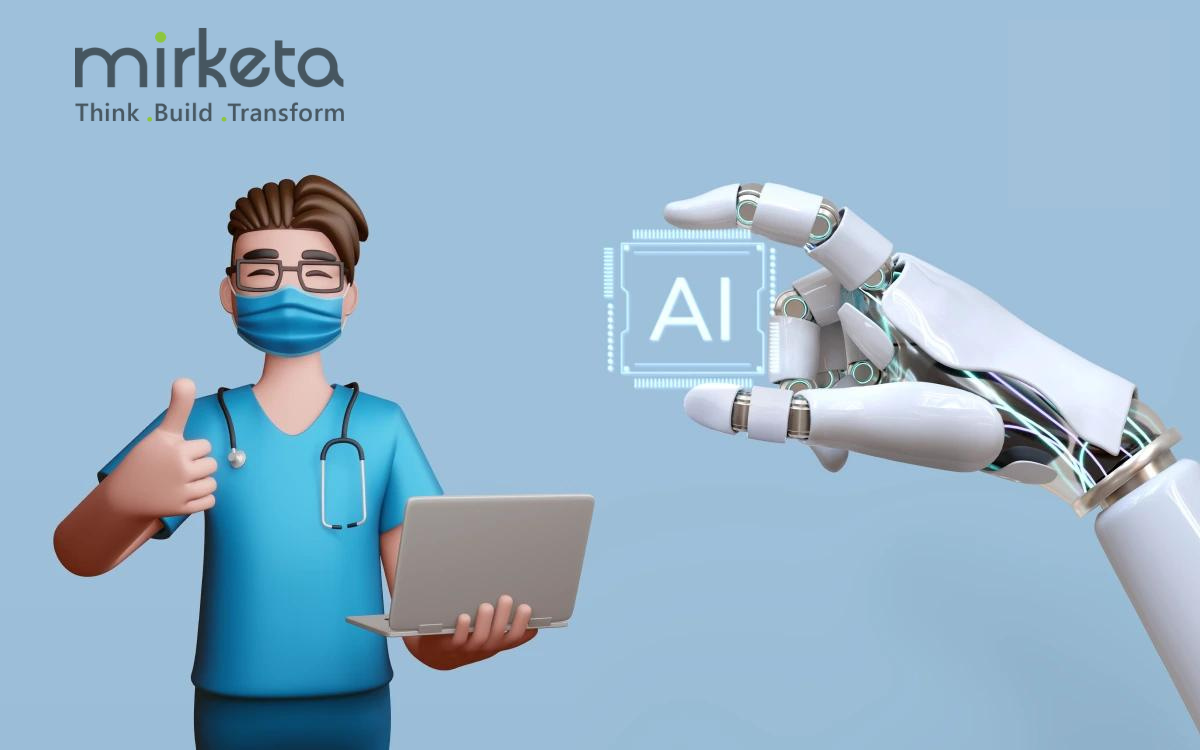Artificial Intelligence (AI) is revolutionizing healthcare, reshaping the way we diagnose and treat various medical conditions. This transformative technology, once confined to the realm of science fiction, is now an integral part of modern healthcare systems. From diagnostic algorithms that outperform human doctors to AI-driven robotic surgeries, AI is making a profound impact on healthcare. In this article, we will explore the ways AI is changing the face of healthcare.

The Rise of AI in Healthcare
The integration of AI in healthcare is driven by its potential to significantly enhance diagnostic accuracy, streamline treatment processes, and improve patient outcomes. The sheer volume of medical data generated daily, ranging from medical records and imaging studies to genomics, exceeds human capacity to process efficiently. Artificial Intelligence, particularly machine learning and deep learning algorithms, excels at processing and extracting insights from this wealth of information.
Diagnosis and Early Detection
One of the most remarkable applications of AI in healthcare is in the field of diagnosis. AI algorithms can analyze patient data, such as medical histories, symptoms, and diagnostic images, with an incredible level of precision. This has the potential to lead to earlier and more accurate disease detection. For example, AI-powered systems can detect certain cancers from radiological images, such as mammograms and CT scans, at an earlier stage than human radiologists.
Furthermore, AI systems can analyze vast datasets of patient information to identify patterns and risk factors for various diseases. This enables healthcare providers to develop personalized treatment plans and preventive strategies, thereby reducing the burden of disease.
Drug Discovery and Development
AI is playing a crucial role in accelerating drug discovery and development. Machine learning models can analyze massive datasets to identify potential drug candidates and predict their effectiveness in treating specific diseases. This not only reduces the time and cost of drug development but also leads to the discovery of novel treatments.
Remote Patient Monitoring
AI facilitates remote monitoring of patients with chronic conditions. Wearable devices and sensors can collect real-time data on a patient’s vital signs and health parameters. AI algorithms can then analyze this data, alerting healthcare providers to any concerning trends or anomalies, enabling proactive interventions.
Treatment Customization
AI also plays a vital role in treatment customization. AI algorithms can process genetic and molecular data to tailor treatment plans for individual patients. For instance, in oncology, AI can help determine the most effective cancer treatment based on a patient’s genetic profile. This approach, known as precision medicine, maximizes treatment efficacy while minimizing side effects.
Enhancing Surgery
AI-driven robotics are increasingly being used to enhance surgical procedures. Surgical robots can provide exceptional precision and stability, reducing the risk of human error. Surgeons can remotely control robotic arms for intricate procedures, making minimally invasive surgery more accessible and efficient.
Predictive Analytics
AI can predict disease outbreaks and help allocate resources efficiently. By analyzing data from various sources, including social media, health records, and environmental factors, AI can provide early warning signals for potential epidemics. This proactive approach is invaluable in disease prevention and control.
Virtual Health Assistants
AI-powered virtual health assistants and chatbots are becoming increasingly common in healthcare. These virtual assistants can provide patients with information, answer medical queries, and even schedule appointments. They enhance patient engagement and provide quick access to healthcare information.
Mental Health Support
AI-powered mental health chatbots and apps are gaining popularity. They can provide support, guidance, and even early intervention for individuals experiencing mental health challenges. These tools help bridge the gap in mental health care availability.
Challenges and Ethical Considerations
While AI holds immense promise in healthcare, it also comes with challenges and ethical considerations. The reliance on AI for critical healthcare decisions requires addressing issues of transparency, bias, and privacy. Healthcare providers and AI developers must ensure that algorithms are transparent, regularly validated, and free from bias. Additionally, protecting patient data is a significant concern, necessitating robust data security measures.
The Human Touch
It’s crucial to emphasize that AI is a tool to augment human capabilities, not replace them. While AI can process vast amounts of data and provide recommendations, the human factor remains irreplaceable in healthcare. The empathy, communication, and judgment of healthcare professionals are vital aspects of patient care.
AI can certainly analyze data and assist in decision-making, but the human touch is irreplaceable when it comes to providing emotional support, understanding complex patient needs, and communicating effectively with patients and their families. The collaboration between AI and healthcare professionals should focus on enhancing the overall quality of care rather than replacing the human element.
Conclusion
Artificial intelligence is rapidly transforming healthcare, offering a promising future of more accurate diagnoses, personalized treatments, and improved patient outcomes. As AI technology continues to advance, it is essential that healthcare providers, policymakers, and developers collaborate to ensure the responsible and ethical integration of AI into healthcare systems. The combination of human expertise and AI capabilities has the potential to revolutionize medicine, making it more efficient and patient-centered than ever before. With the right balance and ethical considerations, AI can truly be a game-changer in healthcare, benefiting both patients and healthcare professionals.
The integration of AI in healthcare is not without its challenges, but as technology and regulations evolve, it holds great promise in addressing some of the most pressing issues in healthcare. With a commitment to transparency, fairness, and privacy, AI can be a valuable ally in the ongoing effort to improve healthcare outcomes and the overall patient experience. As AI in healthcare continues to advance, the medical community should embrace it as a tool that complements the human touch, leading to a more efficient, accurate, and patient-centered healthcare system.
Leave A Comment